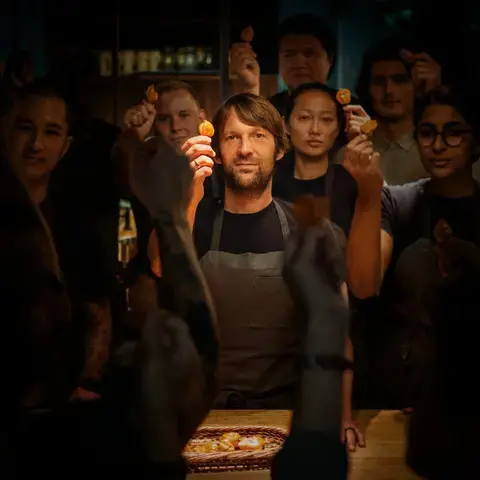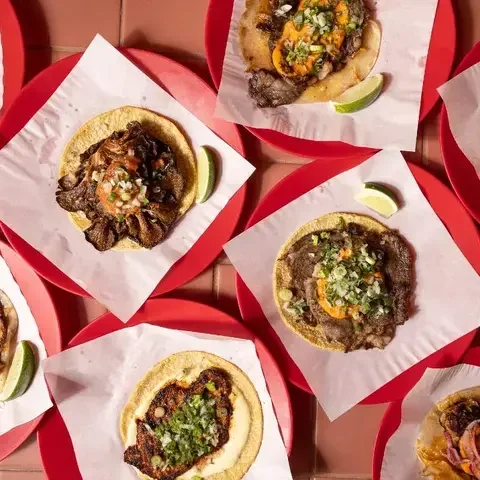It took the food world by surprise when, in November 2021, Brazilian chef Alex Atala announced on stage at San Sebastian Gastronomika - a food symposium held in the Basque Country - that he was stepping down from D.O.M., or “taking a side step”. He continued: “From now on, the restaurant no longer belongs to Alex Atala. D.O.M. is now on my team.”
The pandemic was central to his decision. "It was a pretty tough moment for the restaurant and for me, but if D.O.M. survived for the last two decades — and it survived well — I owe it to my team, who supported me, and helped me to make the best decisions in a very assertive way. I understand today that the greatest strength of D.O.M. is its team,” he said.
The chef pointed out that, thanks to his staff, the restaurant achieved stability and no longer needs his presence all the time. “This does not mean, however, that I will not be involved in all the successes or failures that D.O.M. may have," he explained. According to the chef, his role will be also to support the front desk, the administrative, purchasing and maintenance sectors.
Atala's decision comes at a time when the restaurant industry is going through its most severe staffing crisis, which looks set to continue into 2022. The pandemic has forced restaurants to reduce hours, cut entire service shifts and close on days they were usually open. But more than that, it has also forced them to create new ways of interacting with their employees to retain their services — or even attract people back to the sector.
The health and economic crisis has led to redundancies, forcing people to look for new jobs. But it also allowed them to rethink the work they were doing in restaurants. Many moved to the countryside, others found less exhausting work routines, often earning similar wages — but no longer with the late night shifts, nor the pressure they were usually exposed to.
The crisis is unprecedented and global. Even McDonald's sales have gone down by around 4% because of labour shortages. In the US, an ‘Antiwork Movement’ took hold after Kit Stoll, a barista, decided to quit her job in the middle of her shift after her boss yelled at her. She posted the story on Reddit, which went viral and generated a deep discussion about working conditions in restaurants. “The restaurant business doesn't have an employee problem, it has a wage and benefit problem,” she said.
On their side, many entrepreneurs and restaurant owners have tried their best to avoid layoffs in the most difficult months of the lockdown, pivoting their business models towards new and casual concepts, relying on delivery, and creating new alternatives. Now they are struggling to make the restaurant industry one that workers will actively want to return to.
Many realised they needed to offer better working conditions and higher pay, which may only be possible with a structural change in the sector. Since the pandemic affected his businesses — forcing him to pivot his three-Michelin-starred restaurant Noma into a burger joint during the summer of 2019 — Danish chef René Redzepi has been pondering how to make both the company's economic health and the employees’ life at work more sustainable.
"We are going through a necessary change in our industry, but it comes with an incredible amount of complications, trials and turbulence. It is a system that has always been based on low wages because it is an industry in which there is little money if compared to others," said Redzepi.
His goal is to reach what he calls ’25/25’. "That's our magic number," he explains. "Our goal would be to get a 25% increase in salary for the entire team and reduce everyone's working hours by 25%. But to do that today, we would have to increase the value of our menu by around 75%, which would be unfeasible.” To help increase income, Redzepi and his partners are betting on initiatives such as Noma Projects, an arm of the restaurant that will release a home line of products, such as garum condiments.
Other chefs agree that one of the best ways to improve the structure of work in restaurants is to increase profits and pay better wages. Two weeks ago, when Spanish chef Dabiz Muñoz announced he would raise the price of the set menu at his multi-award winning DiverXO in Madrid to 365 Euros, the news created controversy. The 50% increase seemed extortionate to many.
Muñoz said the price hike was necessary to make the restaurant economically viable, and able to better compensate the employees who have been working with him for so long. "We had to create side businesses for DiverXO to subsist. Because almost every year, we have had a lot of losses. We have a lot of people working and what the restaurant generates is not enough to improve the working conditions we want to offer.”
"It's a very honest reflection: if the restaurant doesn't have an audience that is willing to pay that amount so that we can achieve what we need — and I hope we do, by the many bookings we've had — then DiverXO can no longer exist. If we can't improve the level of our dishes and the conditions of our employees, then it would be better to close and do something else, which we are capable of doing, and which I don't see as any sign of failure,” he says.
In a text published last July at The Hill, co-owner of Medium Rare Restaurant Group, Mark Bucher, wrote that the last two years he has done all he could so his business and his people would survive the current crisis. “But this was not heroism, it was capitalism. Capitalism means balancing supply and demand in a market economy. Capitalism means solving our own problems.”
“I believe a growing number of my fellow restaurant owners recognise that an industry in which 50 percent of restaurants fail after three years is fundamentally flawed. We need to rebuild our businesses to succeed for the long term. We need to redesign restaurants with staff in mind,” he said.
This idea permeates not only high-end restaurants, of course, but also more casual concepts, where often it’s easier to value the effort of employees and offer better working and salary conditions to reverse the ‘nobody wants to work’ idea.
At Bagerit B, a small bakery in Copenhagen, pastry chef Sam Little is trying to help his staff stick around by increasing their sense of ownership. “I think during lockdowns a lot of people started asking themselves what’s the point in working 50+ hours a week, and why they’re contributing so much to a workplace that essentially can’t look after them, or is interested in investing in them”, he says.
He tried to establish a good relationship with his staff, not only by setting up boundaries with communication (like no messages before 10am and after 10pm, emergencies aside) and not disturbing people on their breaks, but also offering paid breaks with food. “The costs add up, but I hope it’s appreciated”, he adds. He is even considering offering shares of his company to employees in the future, so they know they are working for their own benefit as well.
While a fair wage is one of the most effective ways to recognise the work of employees in this industry, it is not the only way. El Celler de Can Roca, a three-Michelin-star restaurant run by brothers Josep, Joan, and Jordi Roca in Girona, Spain, was one of the first to take a closer look at its employees. In 2017, they hired a psychologist for weekly sessions in which employees (from back to front of house) could talk about their frustrations and anxieties.
Less than two years ago, the restaurant adopted a shift work system restricted to eight hours of work a day to ensure work-family balance for its employees. "We believe it's something very important, but historically it has always been very complicated in the restaurant industry, in which people used to work many more hours," explained Joana Pedret, the Roca Group's human resources director. This is especially true if when we consider that restaurant jobs are not always regularised, and where double shifts with almost no breaks are commonplace.
Her job, she says, is to serve employees with the same dedication that the restaurant serves customers: "They are taking care of our guests but often they also need to be taken care of." She tries to listen to their needs and to keep them motivated and satisfied with their roles in the restaurant. "You have to propose challenges but also let your team take charge of new organisational solutions. A sense of autonomy is crucial.”
At SingleThread, a three-Michelin-star restaurant in Healdsburg, California, Kyle and Katina Connaughton also offer other benefits for employees, such as 100% medical benefits and paid vacations (an unconventional move for a restaurant in the US), as well as mentoring, apprenticeships and training. "We are very focused on wine education, cooking, but also on the most important leadership skills. We have daily meetings and briefings where all staff members participate and help lead with new information and presentations," said Kyle.
He says they foster an environment where team members support and help each other rather than competing for a higher staff position — which can be all too common in haute cuisine. The restaurant owners also have a retirement plan and a program to give each staff member eight free counselling sessions every year. "They can use it for mental health, financial planning, legal advice, family counselling, etc.," he explained.
According to Connaughton, the restaurant industry needs to focus more on education and mentoring if the people involved are to anticipate the changes that are needed. "Teaching young chefs how to cook, for example, is only part of it. We have to take it upon ourselves to teach them to be good leaders and to support good food systems." Only then, he believes, will it be possible to create a transformation engine to make restaurants truly attractive places to work, with chances for real professional development.
"We need to treat our staff with dignity and kindness, it is our mission to train the next generation of thoughtful leaders for our industry. This is the legacy we want to leave behind.”














